Business Management Employability Skills Journal Assignment
VerifiedAdded on 2021/04/21
|7
|1297
|161
Homework Assignment
AI Summary
This assignment is a journal exploring employability skills for business management students. It begins with self-assessment using Gallup Strengths theory to identify personal strengths such as positivity, empathy, and a developer mindset. The second journal entry applies Johari's Theory to understand sector dynamics and team performance, emphasizing the importance of individual expertise within a group. The final entry synthesizes the theories, highlighting how personal strengths and understanding group dynamics contribute to professional success. The student reflects on how to leverage their strengths, particularly in communication and collaboration, to navigate workplace challenges and contribute effectively to team goals. The assignment also includes a reference list of academic sources.
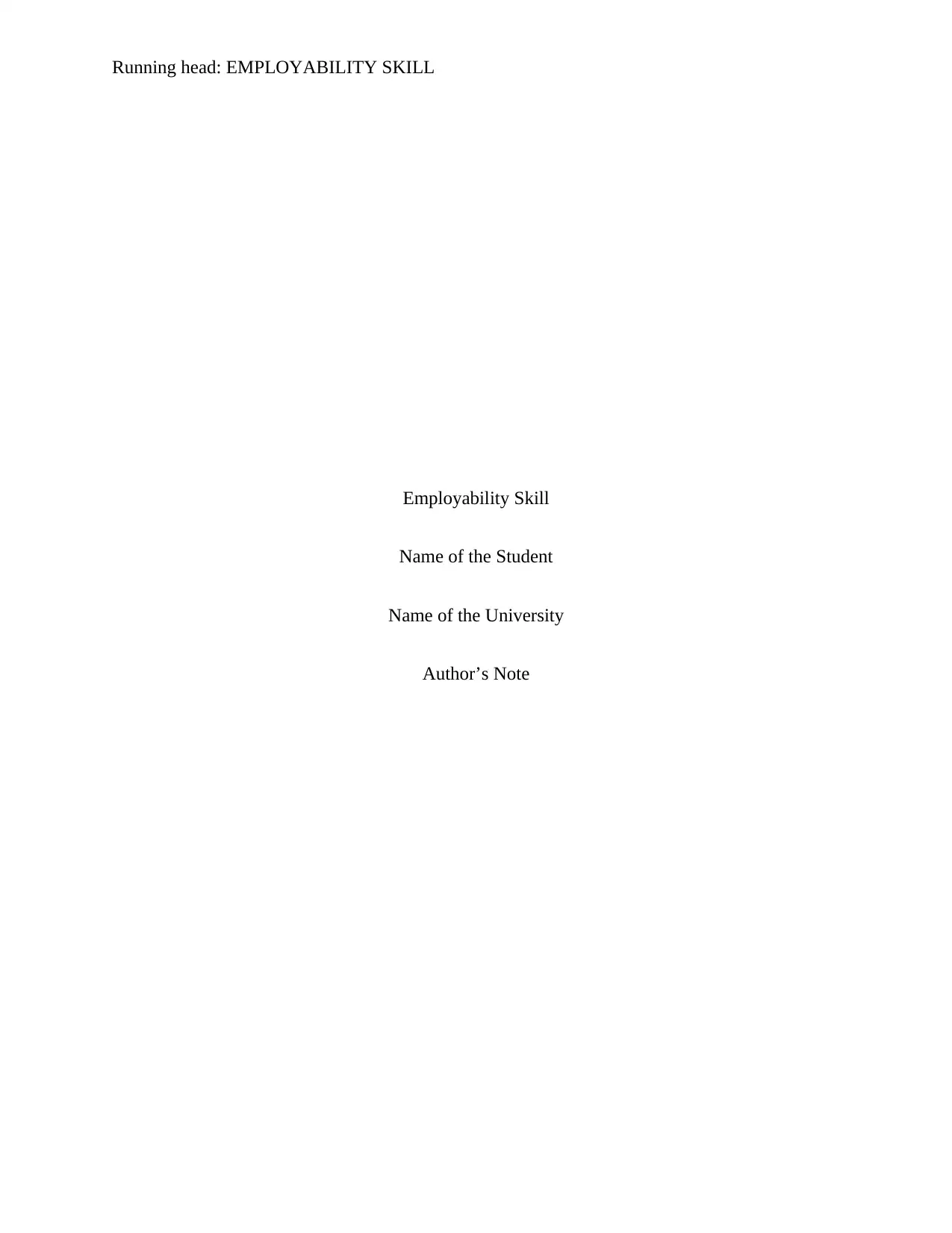
Running head: EMPLOYABILITY SKILL
Employability Skill
Name of the Student
Name of the University
Author’s Note
Employability Skill
Name of the Student
Name of the University
Author’s Note
Paraphrase This Document
Need a fresh take? Get an instant paraphrase of this document with our AI Paraphraser
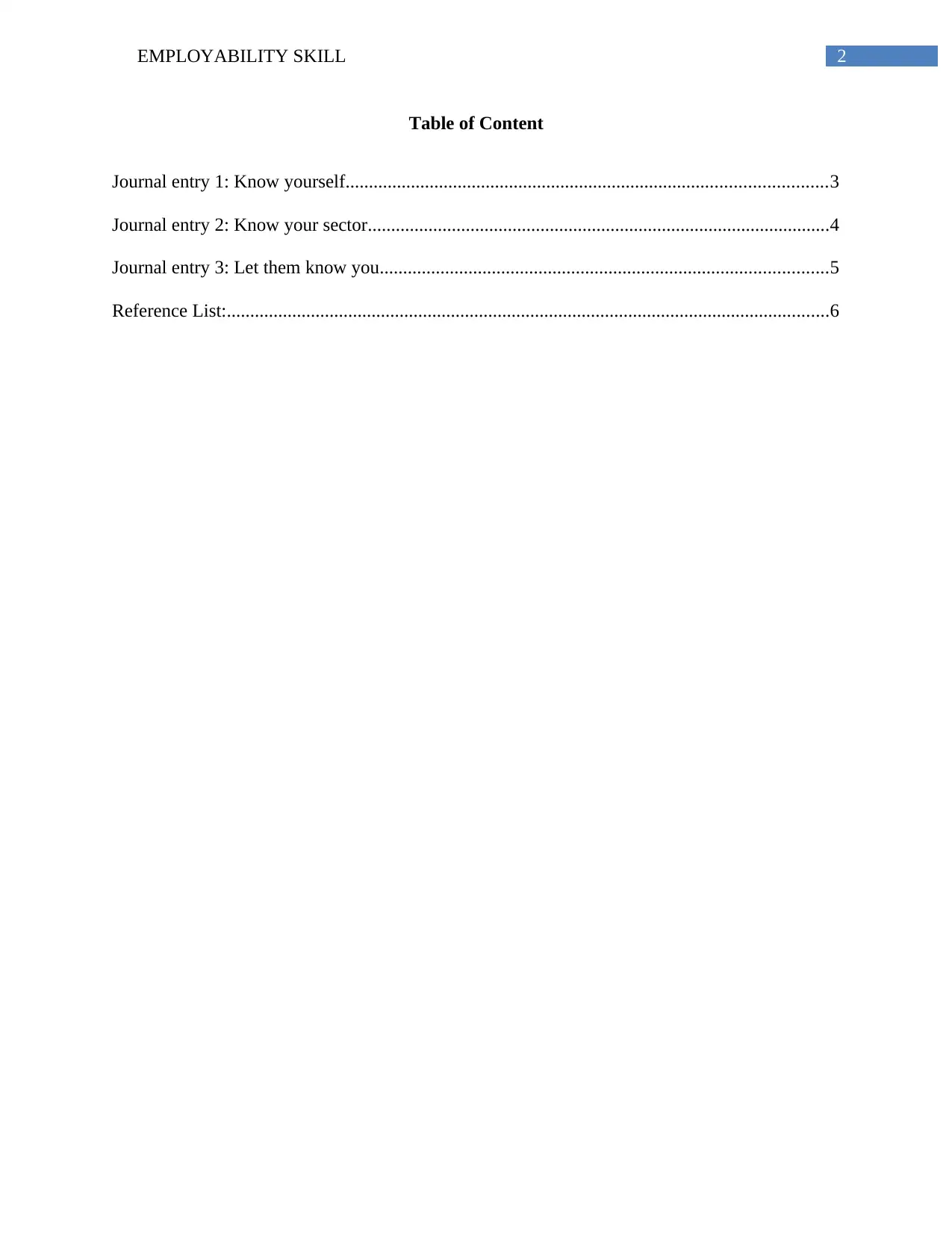
2EMPLOYABILITY SKILL
Table of Content
Journal entry 1: Know yourself.......................................................................................................3
Journal entry 2: Know your sector...................................................................................................4
Journal entry 3: Let them know you................................................................................................5
Reference List:.................................................................................................................................6
Table of Content
Journal entry 1: Know yourself.......................................................................................................3
Journal entry 2: Know your sector...................................................................................................4
Journal entry 3: Let them know you................................................................................................5
Reference List:.................................................................................................................................6
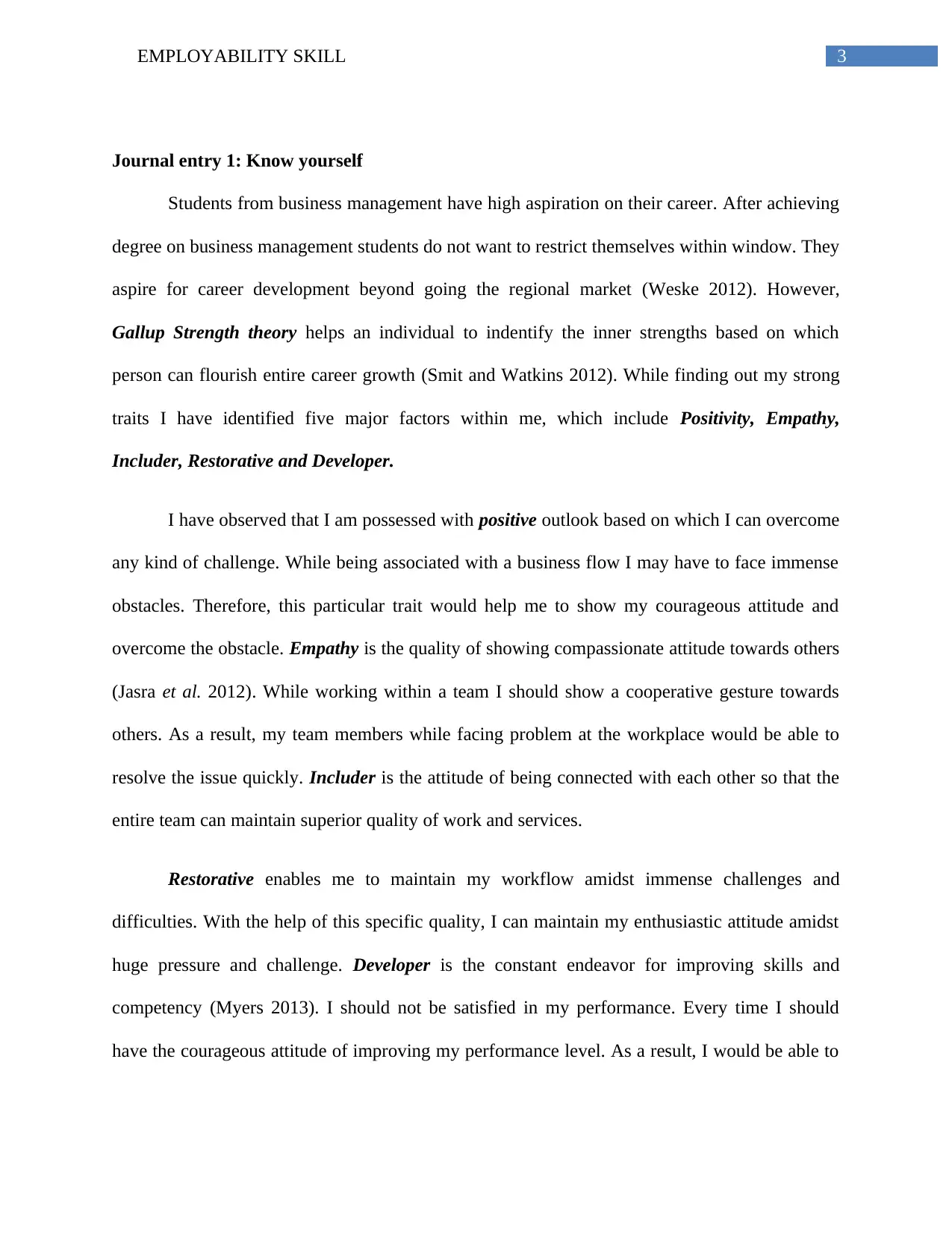
3EMPLOYABILITY SKILL
Journal entry 1: Know yourself
Students from business management have high aspiration on their career. After achieving
degree on business management students do not want to restrict themselves within window. They
aspire for career development beyond going the regional market (Weske 2012). However,
Gallup Strength theory helps an individual to indentify the inner strengths based on which
person can flourish entire career growth (Smit and Watkins 2012). While finding out my strong
traits I have identified five major factors within me, which include Positivity, Empathy,
Includer, Restorative and Developer.
I have observed that I am possessed with positive outlook based on which I can overcome
any kind of challenge. While being associated with a business flow I may have to face immense
obstacles. Therefore, this particular trait would help me to show my courageous attitude and
overcome the obstacle. Empathy is the quality of showing compassionate attitude towards others
(Jasra et al. 2012). While working within a team I should show a cooperative gesture towards
others. As a result, my team members while facing problem at the workplace would be able to
resolve the issue quickly. Includer is the attitude of being connected with each other so that the
entire team can maintain superior quality of work and services.
Restorative enables me to maintain my workflow amidst immense challenges and
difficulties. With the help of this specific quality, I can maintain my enthusiastic attitude amidst
huge pressure and challenge. Developer is the constant endeavor for improving skills and
competency (Myers 2013). I should not be satisfied in my performance. Every time I should
have the courageous attitude of improving my performance level. As a result, I would be able to
Journal entry 1: Know yourself
Students from business management have high aspiration on their career. After achieving
degree on business management students do not want to restrict themselves within window. They
aspire for career development beyond going the regional market (Weske 2012). However,
Gallup Strength theory helps an individual to indentify the inner strengths based on which
person can flourish entire career growth (Smit and Watkins 2012). While finding out my strong
traits I have identified five major factors within me, which include Positivity, Empathy,
Includer, Restorative and Developer.
I have observed that I am possessed with positive outlook based on which I can overcome
any kind of challenge. While being associated with a business flow I may have to face immense
obstacles. Therefore, this particular trait would help me to show my courageous attitude and
overcome the obstacle. Empathy is the quality of showing compassionate attitude towards others
(Jasra et al. 2012). While working within a team I should show a cooperative gesture towards
others. As a result, my team members while facing problem at the workplace would be able to
resolve the issue quickly. Includer is the attitude of being connected with each other so that the
entire team can maintain superior quality of work and services.
Restorative enables me to maintain my workflow amidst immense challenges and
difficulties. With the help of this specific quality, I can maintain my enthusiastic attitude amidst
huge pressure and challenge. Developer is the constant endeavor for improving skills and
competency (Myers 2013). I should not be satisfied in my performance. Every time I should
have the courageous attitude of improving my performance level. As a result, I would be able to
⊘ This is a preview!⊘
Do you want full access?
Subscribe today to unlock all pages.

Trusted by 1+ million students worldwide
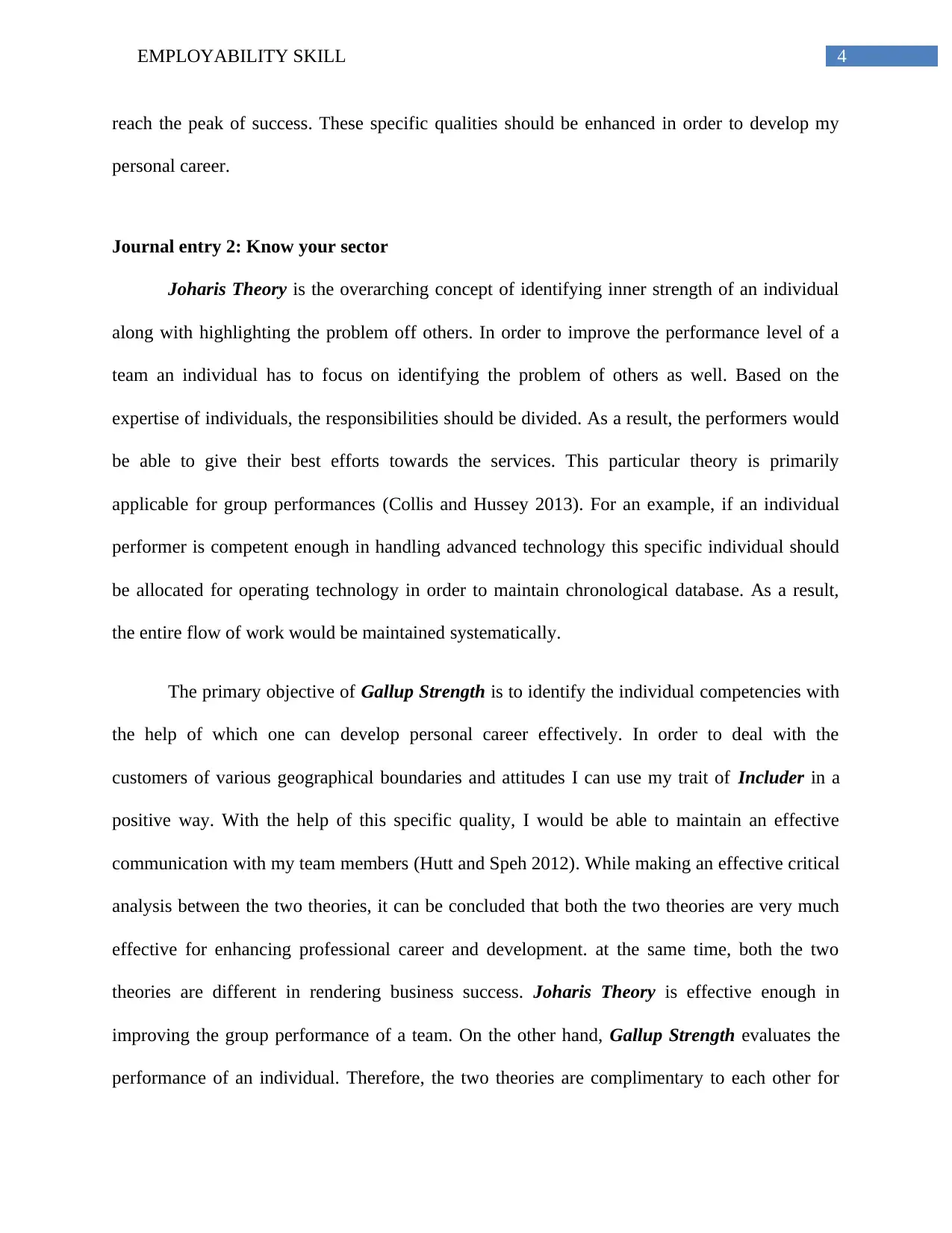
4EMPLOYABILITY SKILL
reach the peak of success. These specific qualities should be enhanced in order to develop my
personal career.
Journal entry 2: Know your sector
Joharis Theory is the overarching concept of identifying inner strength of an individual
along with highlighting the problem off others. In order to improve the performance level of a
team an individual has to focus on identifying the problem of others as well. Based on the
expertise of individuals, the responsibilities should be divided. As a result, the performers would
be able to give their best efforts towards the services. This particular theory is primarily
applicable for group performances (Collis and Hussey 2013). For an example, if an individual
performer is competent enough in handling advanced technology this specific individual should
be allocated for operating technology in order to maintain chronological database. As a result,
the entire flow of work would be maintained systematically.
The primary objective of Gallup Strength is to identify the individual competencies with
the help of which one can develop personal career effectively. In order to deal with the
customers of various geographical boundaries and attitudes I can use my trait of Includer in a
positive way. With the help of this specific quality, I would be able to maintain an effective
communication with my team members (Hutt and Speh 2012). While making an effective critical
analysis between the two theories, it can be concluded that both the two theories are very much
effective for enhancing professional career and development. at the same time, both the two
theories are different in rendering business success. Joharis Theory is effective enough in
improving the group performance of a team. On the other hand, Gallup Strength evaluates the
performance of an individual. Therefore, the two theories are complimentary to each other for
reach the peak of success. These specific qualities should be enhanced in order to develop my
personal career.
Journal entry 2: Know your sector
Joharis Theory is the overarching concept of identifying inner strength of an individual
along with highlighting the problem off others. In order to improve the performance level of a
team an individual has to focus on identifying the problem of others as well. Based on the
expertise of individuals, the responsibilities should be divided. As a result, the performers would
be able to give their best efforts towards the services. This particular theory is primarily
applicable for group performances (Collis and Hussey 2013). For an example, if an individual
performer is competent enough in handling advanced technology this specific individual should
be allocated for operating technology in order to maintain chronological database. As a result,
the entire flow of work would be maintained systematically.
The primary objective of Gallup Strength is to identify the individual competencies with
the help of which one can develop personal career effectively. In order to deal with the
customers of various geographical boundaries and attitudes I can use my trait of Includer in a
positive way. With the help of this specific quality, I would be able to maintain an effective
communication with my team members (Hutt and Speh 2012). While making an effective critical
analysis between the two theories, it can be concluded that both the two theories are very much
effective for enhancing professional career and development. at the same time, both the two
theories are different in rendering business success. Joharis Theory is effective enough in
improving the group performance of a team. On the other hand, Gallup Strength evaluates the
performance of an individual. Therefore, the two theories are complimentary to each other for
Paraphrase This Document
Need a fresh take? Get an instant paraphrase of this document with our AI Paraphraser
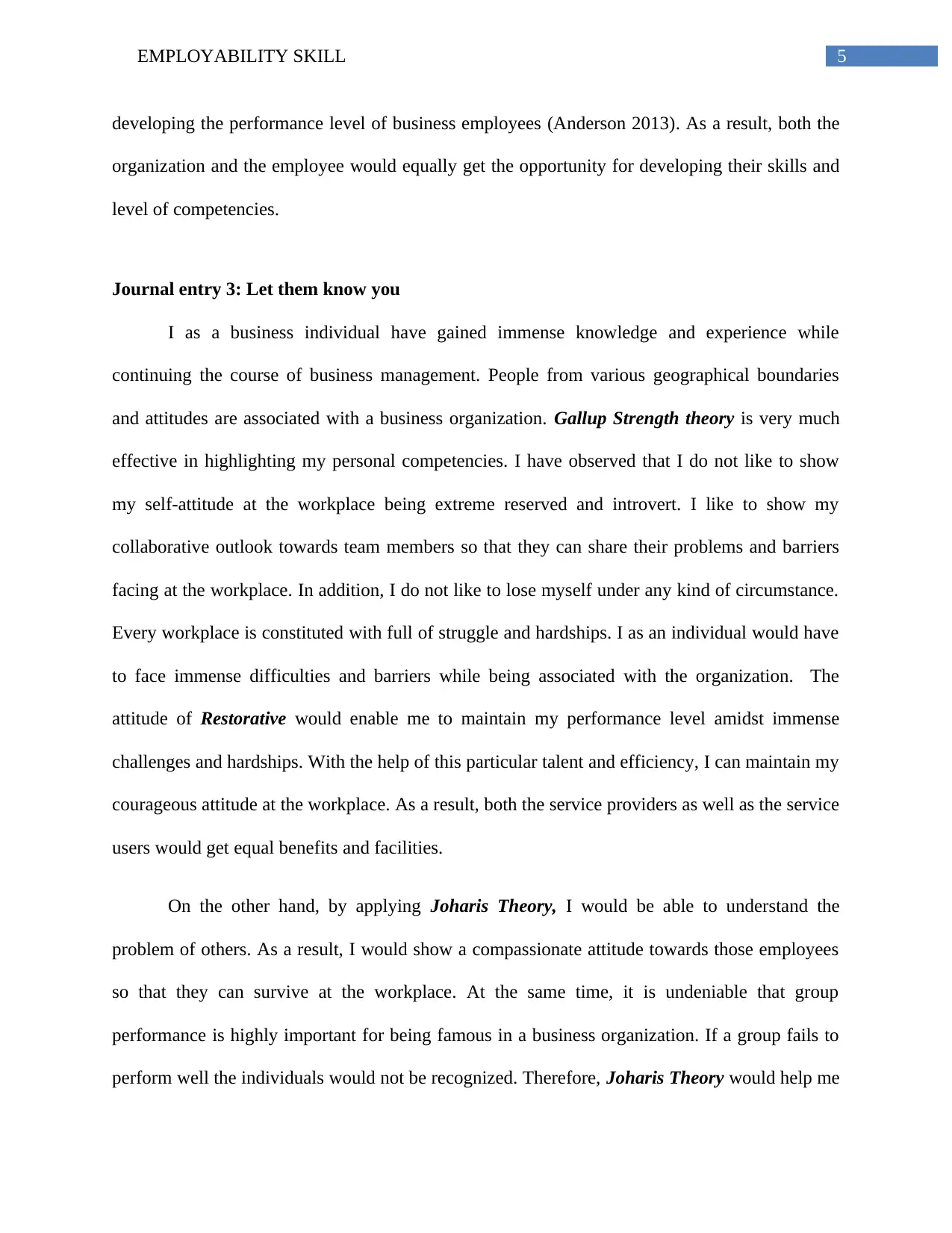
5EMPLOYABILITY SKILL
developing the performance level of business employees (Anderson 2013). As a result, both the
organization and the employee would equally get the opportunity for developing their skills and
level of competencies.
Journal entry 3: Let them know you
I as a business individual have gained immense knowledge and experience while
continuing the course of business management. People from various geographical boundaries
and attitudes are associated with a business organization. Gallup Strength theory is very much
effective in highlighting my personal competencies. I have observed that I do not like to show
my self-attitude at the workplace being extreme reserved and introvert. I like to show my
collaborative outlook towards team members so that they can share their problems and barriers
facing at the workplace. In addition, I do not like to lose myself under any kind of circumstance.
Every workplace is constituted with full of struggle and hardships. I as an individual would have
to face immense difficulties and barriers while being associated with the organization. The
attitude of Restorative would enable me to maintain my performance level amidst immense
challenges and hardships. With the help of this particular talent and efficiency, I can maintain my
courageous attitude at the workplace. As a result, both the service providers as well as the service
users would get equal benefits and facilities.
On the other hand, by applying Joharis Theory, I would be able to understand the
problem of others. As a result, I would show a compassionate attitude towards those employees
so that they can survive at the workplace. At the same time, it is undeniable that group
performance is highly important for being famous in a business organization. If a group fails to
perform well the individuals would not be recognized. Therefore, Joharis Theory would help me
developing the performance level of business employees (Anderson 2013). As a result, both the
organization and the employee would equally get the opportunity for developing their skills and
level of competencies.
Journal entry 3: Let them know you
I as a business individual have gained immense knowledge and experience while
continuing the course of business management. People from various geographical boundaries
and attitudes are associated with a business organization. Gallup Strength theory is very much
effective in highlighting my personal competencies. I have observed that I do not like to show
my self-attitude at the workplace being extreme reserved and introvert. I like to show my
collaborative outlook towards team members so that they can share their problems and barriers
facing at the workplace. In addition, I do not like to lose myself under any kind of circumstance.
Every workplace is constituted with full of struggle and hardships. I as an individual would have
to face immense difficulties and barriers while being associated with the organization. The
attitude of Restorative would enable me to maintain my performance level amidst immense
challenges and hardships. With the help of this particular talent and efficiency, I can maintain my
courageous attitude at the workplace. As a result, both the service providers as well as the service
users would get equal benefits and facilities.
On the other hand, by applying Joharis Theory, I would be able to understand the
problem of others. As a result, I would show a compassionate attitude towards those employees
so that they can survive at the workplace. At the same time, it is undeniable that group
performance is highly important for being famous in a business organization. If a group fails to
perform well the individuals would not be recognized. Therefore, Joharis Theory would help me
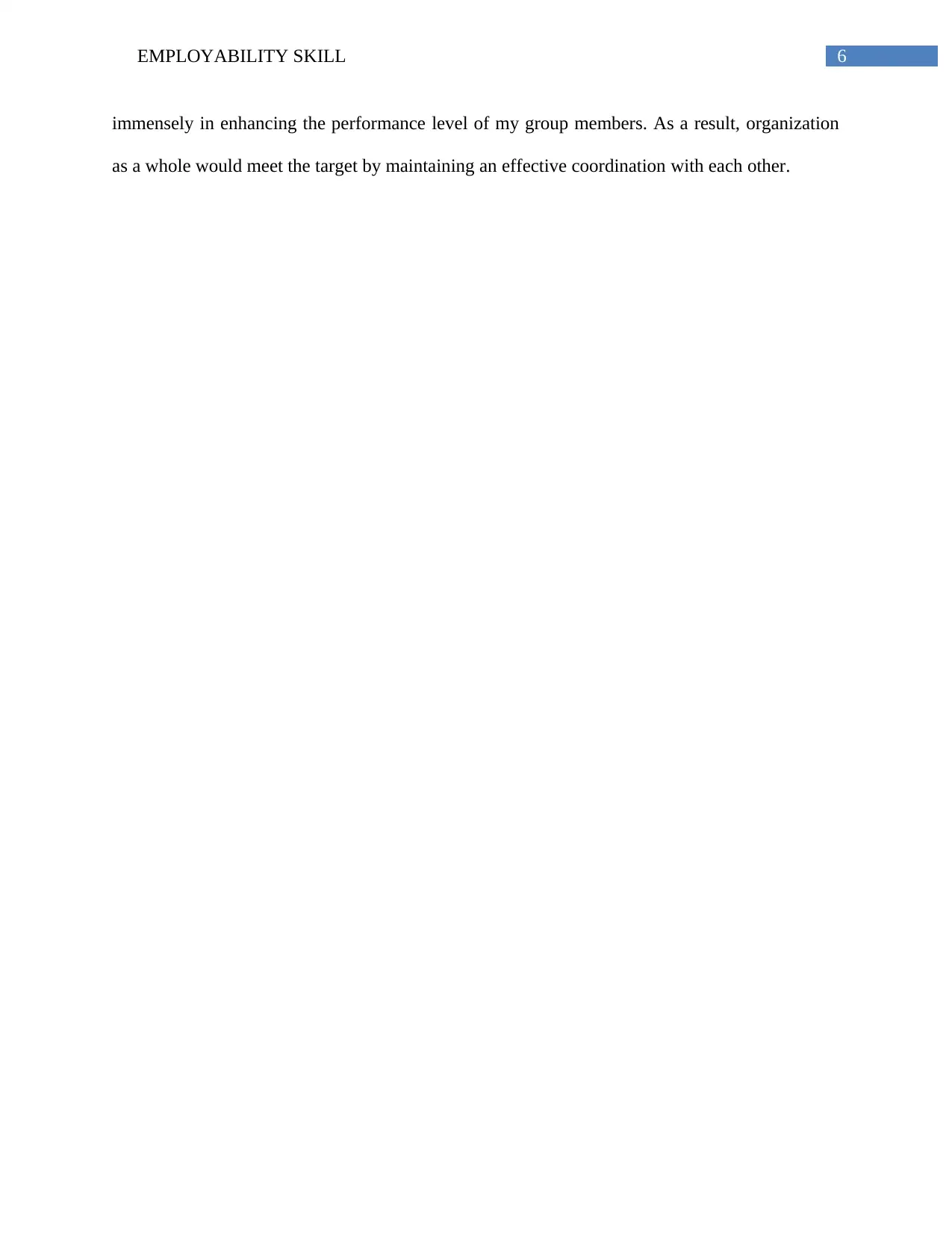
6EMPLOYABILITY SKILL
immensely in enhancing the performance level of my group members. As a result, organization
as a whole would meet the target by maintaining an effective coordination with each other.
immensely in enhancing the performance level of my group members. As a result, organization
as a whole would meet the target by maintaining an effective coordination with each other.
⊘ This is a preview!⊘
Do you want full access?
Subscribe today to unlock all pages.

Trusted by 1+ million students worldwide
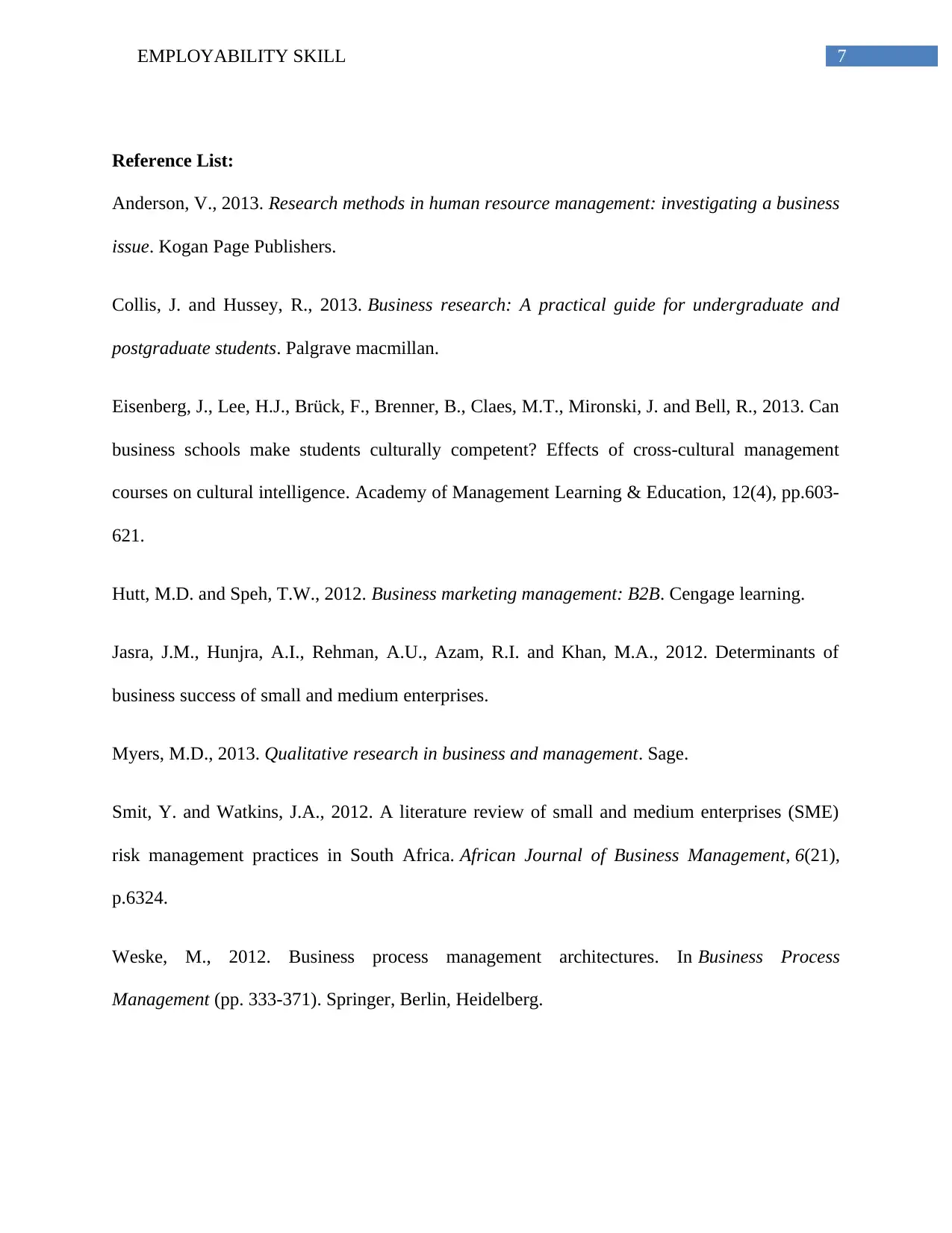
7EMPLOYABILITY SKILL
Reference List:
Anderson, V., 2013. Research methods in human resource management: investigating a business
issue. Kogan Page Publishers.
Collis, J. and Hussey, R., 2013. Business research: A practical guide for undergraduate and
postgraduate students. Palgrave macmillan.
Eisenberg, J., Lee, H.J., Brück, F., Brenner, B., Claes, M.T., Mironski, J. and Bell, R., 2013. Can
business schools make students culturally competent? Effects of cross-cultural management
courses on cultural intelligence. Academy of Management Learning & Education, 12(4), pp.603-
621.
Hutt, M.D. and Speh, T.W., 2012. Business marketing management: B2B. Cengage learning.
Jasra, J.M., Hunjra, A.I., Rehman, A.U., Azam, R.I. and Khan, M.A., 2012. Determinants of
business success of small and medium enterprises.
Myers, M.D., 2013. Qualitative research in business and management. Sage.
Smit, Y. and Watkins, J.A., 2012. A literature review of small and medium enterprises (SME)
risk management practices in South Africa. African Journal of Business Management, 6(21),
p.6324.
Weske, M., 2012. Business process management architectures. In Business Process
Management (pp. 333-371). Springer, Berlin, Heidelberg.
Reference List:
Anderson, V., 2013. Research methods in human resource management: investigating a business
issue. Kogan Page Publishers.
Collis, J. and Hussey, R., 2013. Business research: A practical guide for undergraduate and
postgraduate students. Palgrave macmillan.
Eisenberg, J., Lee, H.J., Brück, F., Brenner, B., Claes, M.T., Mironski, J. and Bell, R., 2013. Can
business schools make students culturally competent? Effects of cross-cultural management
courses on cultural intelligence. Academy of Management Learning & Education, 12(4), pp.603-
621.
Hutt, M.D. and Speh, T.W., 2012. Business marketing management: B2B. Cengage learning.
Jasra, J.M., Hunjra, A.I., Rehman, A.U., Azam, R.I. and Khan, M.A., 2012. Determinants of
business success of small and medium enterprises.
Myers, M.D., 2013. Qualitative research in business and management. Sage.
Smit, Y. and Watkins, J.A., 2012. A literature review of small and medium enterprises (SME)
risk management practices in South Africa. African Journal of Business Management, 6(21),
p.6324.
Weske, M., 2012. Business process management architectures. In Business Process
Management (pp. 333-371). Springer, Berlin, Heidelberg.
1 out of 7
Related Documents
Your All-in-One AI-Powered Toolkit for Academic Success.
+13062052269
info@desklib.com
Available 24*7 on WhatsApp / Email
![[object Object]](/_next/static/media/star-bottom.7253800d.svg)
Unlock your academic potential
Copyright © 2020–2026 A2Z Services. All Rights Reserved. Developed and managed by ZUCOL.





